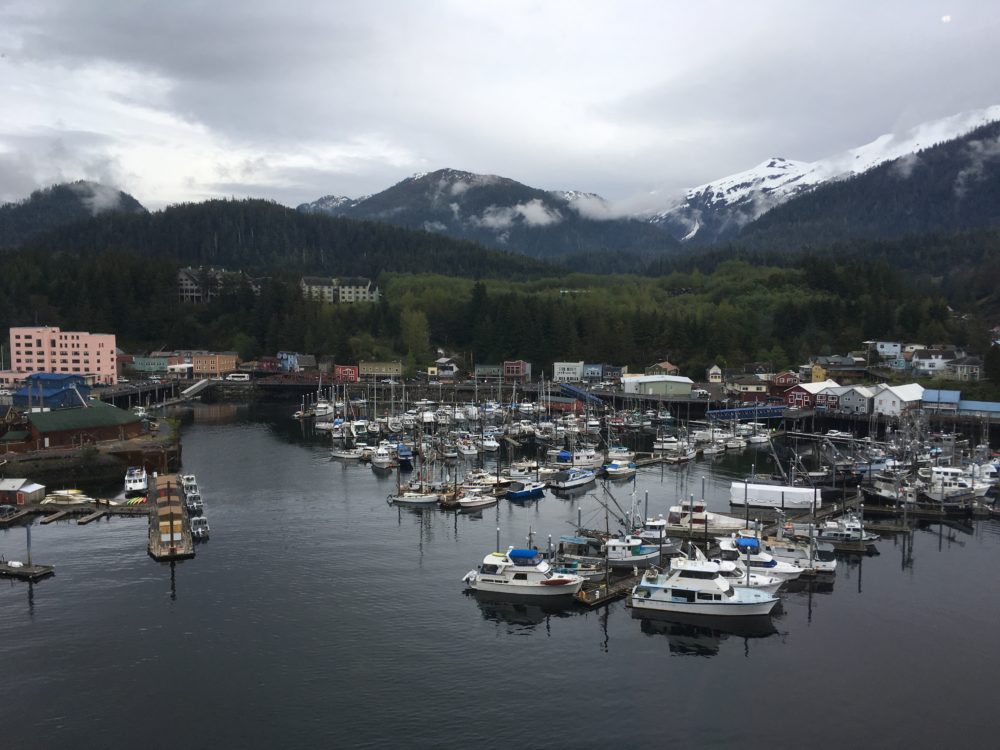
Ketchikan’s Thomas Basin Boat Harbor is seen from a visiting cruise ship. (KRBD file photo by Leila Kheiry)
A bill meant to discourage boat owners from abandoning derelict vessels in public waters is moving through the Alaska Legislature. It’s supported by a state harbors organization, but a Prince of Wales Island fisherman has objections.
Audio PlayerAndy Deering is a commercial troller based in Craig. He has two boats. One is his home and the other is for work. If Senate Bill 92 and the companion House Bill 386 pass, he and everyone else in the state who owns a boat will be affected.
“And it will affect you negatively in the sense that, no question, everybody will be affected with more red tape and more expense,” he said.
Deering has been following the derelict-vessels bill, and said there have been changes as it makes its way through various committees. As it stands, though, he said problems remain.
His concerns include the requirement that all boats be titled, like a car. Deering said he can see how that might be helpful when selling a boat. But, people have been successfully selling boats in the state for a long time without titles.
“It’s potentially OK, but it’s also potentially kind of a pain in the neck with an additional $20 fee,” he said. “And that applies not just to the big boats, but everything right down to the little 14-foot Lunds.”
Deering questions whether there’s any gain from requiring a title on top of state registration or federal documentation. Speaking of registration: that, too, would change. Deering said under the bill, boats that have federal documentation would also need to be registered in the state – with a fee of $30 every three years.
“Getting an additional Alaska state registration on top of that current documentation isn’t going to be anything more than a bunch of revenue for the state and a bunch of inconvenience for law-abiding boaters,” he said.
Rachel Lord in Homer is executive secretary of the Alaska Association of Harbormasters and Port Administrators. She’s also one of the people who helped craft the derelict vessels legislation.
Lord said there will be some extra fees involved – but only enough to pay for the program. She said every section of the proposed bill was written to address a problem. Is registration on top of a title redundant? Well, yes.
“It is redundant because we have seen — time and again, case and case and case again, costing a lot of money – we’re seeing an inability for the state or municipalities, to be able to effectively hold somebody responsible for their property based just on the federal documentation,” she said.
Lord said she understands why responsible boat owners would object to additional regulations.
“I don’t want to make light of or disregard concerns about an added layer,” she said. “I will say however, it is in direct response to a very significant problem, a chronic problem throughout the state.”
Lord gave several examples of boats that became a problem, including a couple outside of Homer. They had been denied entrance at various harbors, and eventually were tied up in state waters near some shellfish farms and abandoned.
Those boats eventually sank, causing an environmental-cleanup problem and shutting down the oyster farms for a while.
She said that incident and others highlighted the limitations of current state regulations. Lord was part of a task force that worked on updates to those statutes, leading to the current proposed legislation.
“We looked at what are the holes, and how do we start making progress to improve things,” she said. “It became pretty clear that our statutes were so outdated and not useful that it needed a full rewrite.”
Lord said every section of the proposed bill directly addresses a problem the group identified when looking at case studies of abandoned boats in Alaska.
The bill includes fines for boat owners who abandon their vessels, and that’s another area Deering questions because it’s the same fines for all boats. Whether it’s a small skiff or a large seiner, the owner would pay from $5,000,up to $10,000. Civil penalties also can be brought.
Lord said that was discussed at length by the task force.
“Nobody could agree on what a high-risk vessel is because of the nature of our remote coastline, the sensitivity of some of our estuaries and fisheries,” she said. “The expense of dealing with almost any size boat, depending on where it is, can be astronomical.”
And, she said, a responsible boat owner wouldn’t have to worry about getting fined, no matter what size their boat is.
Lord added that the legislation includes increased protections for boat owners. So if a vessel is deemed abandoned and derelict by state officials, there would be more legal recourse than currently in the books for a boat owner to contest it.
While additional fees and fines are part of his concerns, Deering said those aren’t what bother him most about this proposed bill. He primarily objects to more rules – like requiring a permit to store a boat in a protected cove, a traditional practice in some parts of Alaska.
“It’s more about the freedom,” he said. “It’s more about what sort of defines us as Alaskans. And the whole concept of freedom and taking away some of those freedoms for very little benefit.”
Deering said he and many others live in Alaska for a reason – they want to avoid all those formal regulations.
But, Lord said those very regulations would help protect Alaska in the long run.





